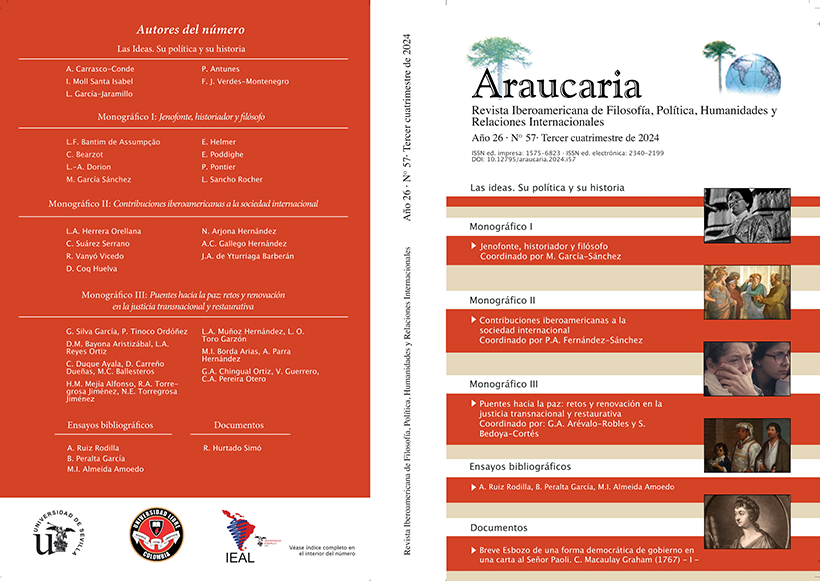Jenofonte, Póroi: ¿una propuesta de economía política?
Xenophon, Póroi: a proposal for political economy?
DOI:
https://doi.org/10.12795/araucaria.2024.i57.14Keywords:
economía política, misthós, imperio, pobreza, moneda, producciónAbstract
Xenophon's last essay, written just after the Athenian defeat in the Social War, raises two interrelated issues: the injustice of the empire and the way in which the Athenians could live off their resources. The various interpretations of Poroi ask whether the author only addresses the fiscal problem or whether he has proposals aimed at improving production and also the work and remuneration of citizens. In this context, it is also discussed whether Ways and Means is part of a primitive and "embedded" economic thought, or whether it reflects the concerns of a rational political economy.
Downloads
References
Azoulay, V. 2006, 1: “Isocrate, Xénophon ou le politique transfiguré”, REA 108, 133-153.
Bearzot, C. 1985: “Da Andocide ad Eschine: Motivi ed ambiguità del pacifismo ateniese nel IV secolo a.C.”, en M. Sordi, ed., La pace nel mondo antico, Milano, CISA XI, 86-107.
Bloch, D. 2004: “The Date of Xenophon’s Poroi”, C&M 55, 5-16.
Bodei Giglioni, G. 1979: Xenophontis, De Vectigalibus. Introduzione, testo critico, traduzione ed indici, Firenze, La Nuova Italia editrice.
Brun, P. 1983: Eisphora - Syntaxeis -Straiotika. Recherches sur les finances militaires d’Athènes au IVe siècle av. J.-C, Paris. PU du Franche Comté.
Burke, E., 1992: “The Economy of Athens in the Classical Era: Some Adjustments to Primitivist Model”, TAPA 122, 199-226.
Cawkwell, G.L. 1963: “Eubulus”, JHS 83, 1963, 47-67.
Ceccarelli, P. 1993: “Sans thalassocratie, pas de démocratie? Le rapport entre thalassocratie et démocratie à Athènes dans la discussion du Ve et IVe siècle av. J.-C., Historia 42, 4, 444-470.
Christensen, P. 2003: “Economics Rationalism in Fourth-Century BCE Athens”, G&R 50.1, 31-48.
Cohen E. 1992: Athenian Economy and Society. A Banking Perspective, Princeton, Princeton University Press.
Deltenre, F.D. 2016: “L’inizio della terza guerre sacre e la datazione dei Poroi di Senofonte”, Athenaeum 104.1, 230-238.
De Martinis, L. 2018: Eubulo e i Poroi di Senofonte. L’Atene del IV secolo tra riflessione teorica e pratica politica, Trieste, Edizioni Università di Trieste.
De Romilly, J. 1954: “Les modérés athéniens vers le milieu de IVe siècle: échos et concordances”, REG 67, 327-354.
Dillery, J. 1993: “Xenophon’s Poroi and Athenian Imperialism”, Historia 42.1, 1-11.
Engen, D.T. 2001: “Trade, Traders, and the Economy of Athens in the Fourth Century B.C.E., en D. Tandy ed., Prehistory and History. Ethnicity, Class and Political Economy, Montreal - New York- London, Block Rose Books, 179-202.
—2005: “Ancient Greensbacks: Athenian Owls. The Law of Nikophon, and the Greek Economy”, Historia 54, 359-378.
Flament, Ch. 2007: Une économie monétarisée: Athènes à l’époque classique. Contribution à l’étude du phénomène monétaire en Grèce ancienne. Louvain-Namur, Peeters.
Gabrielsen, V. 2013: “Finance and Taxes”, en H. Beck ed., A Companion to Ancient Greek Government, Oxford, Wiley-Blackwell, 332-347
Gauthier, Ph. 1976: Un commentaire historique des Poroi de Xénophon, Genève - Paris, Droz.
—2010: “Xenophon’s Programme in the Poroi”, en V. Gray, ed., Xenophon, Oxford Readings in Classical Studies, New York, Oxford University Press, 113-136.
Halkos, G.E.-Kyriazis, N.C. 2010: “The Athenian Economy in the Age of Demosthenes: Path Dependence and Change”, European Journal of Law and Economics 29, 255-277.
Jansen, J.N. 2007: After Empire: Xenophon’s Poroi and the Reorientation of Athens’ Political Economy, Dissertation, University of Texas.
—2012: “Strangers incorporated: Outsiders in Xenophon’s Poroi”, en F. Hobden - Ch. Tuplin, eds. Xenophon: Ethical Principles and Historical Enquiry, Mnemosyne Suppl. 344, Leiden-Boston, Brill, 725-760.
Leese, M. 2021: Making Money in Ancient Athens, Ann Arbor, University of Michigan Press.
Lewis, J.D. 2009: “Xenophon’s Poroi and the Foundations of Political Economy”, Polis. The Journal for Ancient Greek Political Thought 26.2, 370-588.
Lyttkens, C.H. 2013: Economic Analysis of Institutional Change in Ancient Greece. Politics, Taxation and Rational Behabiour, London - New York, Routledge.
Mari, M. 2005: “L’Anonimo di Giamblico e la riflessione greca sull’economia nel IV secolo a.V.”, Med.Ant. 8.1, 119-144.
Moreno, A. 2007: Feeding the Democracy. The Athenian Grain Supply in the Fifth and Fourth Century BC, Oxford, Oxford University Press.
Schorn, S. 2012: “The Philosophic Background of Xenophon’s Poroi”, en F. Hobden - Ch. Tuplin, eds. Xenophon: Ethical Principles and Historical Enquiry, Mnemosyne Suppl. 344, Leiden-Boston, Brill, 689-723.
Schütrumpf, E. 1982: Xenophon Vorschläge zur Beschaffung von Geldmitteln oder über di Staatseinkünfte, Darmstadt, Wissenschaftliche Buchgesellschaft.
Shulsky, A.N. 2018: “An Introduction to the Ways and Means”, en G.A. McBrayer, ed., Xenophon. The Shorter Writings, Ithaka - London, Cornell University Press, 189-209.
Sordi, M. 2005: “Senofonte e la democrazia”, en U. Bultrighini, ed., Democrazia e antidemocrazia nel mondo greco. Atti del Convegno Internazionale di Studi, Chieti, 9-11 aprile 2003, Alessandria, Edizioni dell’Orso, 305-314.
Spielvogel, J. 2006: “Wealth and Demos: Isokrates’s Social and Economic Insights regarding the Athenian Democracy of the Fourth Century B.C.”, Münchener Beiträge zur antiken Handelsgeschichte, Bd. XXII, H. 2, 1-17.
Thomson, W.E. 1982: “The Athenian Entrepreneur”, L’Antiquité Classique 51, 53-85.
Tridimas, G. 2019: “The Debate about Nature of the Ancient Greek Economy: 19th Century German Scholarship and Modern Economic Theory”, German-Greek Yearbook of Political Economy 2, 3-25.
Downloads
Published
How to Cite
Issue
Section
License
Las ediciones impresa y electrónica de esta Revista son editadas por el Secretariado de Publicaciones de la Universidad de Sevilla, siendo necesario citar la procedencia en cualquier reproducción parcial o total.Salvo indicación contraria, todos los contenidos de la edición electrónica se distribuyen bajo una licencia de uso y distribución “Creative Commons Atribución-NoComercial-SinDerivar 4.0 Internacional”








